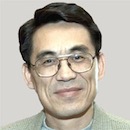Advisory Board and Editors Coupled Natural & Human Systems

Sara Varela
I am working on Pleistocene mammal extinctions. Co-developer of R packages to download data from open access databases (rAvis and paleobioDB), and team member of www.ecoClimate.org, an open access repository to access climatic data for the past, present and future.

Scott Veirs
Oceanographer and bioacoustician facilitating the recovery of endangered regional icons of the Pacific Northwest (U.S.), particularly southern resident killer whales and Pacific salmon. I helped design and was the first major in the Earth Systems program at Stanford University, then earned a M.S. and PhD in Oceanography at the University of Washington. In 2003 I founded Beam Reach and taught ~50 undergraduates and recent graduates to ask and answer their own marine field science questions during 10-week field courses from 2005-2012. During the same period I helped create the Salish Sea Hydrophone Network -- orcasound.net -- which I continue to administer.

Qiang Wang
Qiang Wang received a Ph.D in Environmental Science from the Chinese Academy of Science in 2009, was an Associate Professor (2010) at the Qingdao Institute Of Bioenergy & Bioprocess Technology, Chinese Academy Of Sciences, and a Professor (2011-16) at Xinjiang Ecology And Geography Institute, Chinese Academy Of Sciences, and then moved to China University of Petroleum (2016-2022). His research focuses on energy-environment-health issues through multidisciplinary research methods
Through clever use of time series statistical models (e.g., joint regression models, variable intercept models, variable coefficient models), high-precision combined forecasting models (e.g. gray forecasting and neural network models combined forecasting models), multilateral input-output models, decomposition models (e.g. index decomposition method, structural decomposition method), Dr. Wang has published more than 180 peer-reviewed papers (corresponding author) in high profile English journals.
These papers have been cited over 8,800 (Google Scholar)/ 7,100(Scopus)/ 6,200 (WoS) times by October 2022. 19 papers are selected as global ESI 0.1% Hot Papers, and 36 papers are selected as global ESI 1% Highly Cited Papers that perform in the top 1%. Dr. Wang’s h index is 53 (Google Scholar)/ 49(Scopus)/ 46 (WoS).

Lei Wang
Professor of Geography at Louisiana State University. Research interests include Geocomputation, GeoAI, Remote Sensing of water, Spectroscopic analyses, and mapping flood hazards.

Louise Willemen
Department of Natural Resources, Faculty of Geo-Information and Earth Observation, of University of Twente, the Netherlands.PhD in spatial modelling from Wageningen University, the Netherlands.Worked before @ Bioversity International in Colombia, the European Commission’s Joint Research Centre in Italy, Cornell University in the USA.Current roles: Coordinating Lead Author of the Land Degradation and Restoration assessment of IPBES, Chair of the Steering Committee of Ecosystem Services Partnership, and editorial work for several journals. Ecosystem services and rural development researcher. Current research includes RS-based ecosystem service mapping and monitoring, impact assessments of integrated restoration, and prioritization of investments in land degradation neutrality actions.

Jianguo Wu
Dean's Distinguished Professor of landscape ecology and sustainability science. Current research areas include landscape ecology, urban ecology, and sustainability science. Editor-in-Chief of Landscape Ecology; Elected AAAS Fellow (2007); Distinguished Landscape Ecologist Award from United States Association for Landscape Ecology (2010); Outstanding Scientific Achievements Award from International Association for Landscape Ecology (2011); Elected Fellow of Ecological Society of America (2019).

Jianhua Xu
Jianhua Xu is Professor of Geography and Director of The Research Center for East-West Cooperation in China. He has published 16 books and more than 200 papers. He has worked as the editor of several academic journals, such as Journal of Desert Research, Areal Research and Development, Human Geography, Ecologic Science, Arid Land Geography, Chinese Geographical Science, Journal of Signal and Information Processing, PeerJ, International Journal of Ecology and Ecosolution, etc.

Jianjun Zhang
Professor at the School of Land Science and Technology, China University of Geosciences (Beijing).
I work on land use and sustainability, ecological modeling, land economics and regional planning, low-carbon land use and ecosystem services in human disturbance zones, urban management. The focus of my current research has been expanded to green infrastructures, ecologic economics and heat island effects related with land use.

